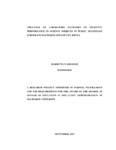INFLUENCE OF LABORATORY FACILITIES ON STUDENTS’ PERFORMANCE IN SCIENCE SUBJECTS IN PUBLIC SECONDARY SCHOOLS IN MACHAKOS SUB-COUNTY, KENYA
Abstract
The purpose of the study was to establish the influence of laboratory facilities on students’ academic performance in science subjects in public secondary schools in Machakos Sub-County, Kenya. Specifically, the study was set to establish the availability of laboratory facilities and equipment in public secondary schools, to find out the extent to which the science teachers use laboratory facilities in teaching science subjects, to establish the relationship between laboratory facilities and the students’ academic performance in science subjects and to establish the challenges faced by the school principals in provision of laboratory facilities. The study was influenced by the fact that the performance of students in science subjects in Machakos Sub- County is still low. The researcher used purposive sampling to select one (1) national school, one (1) extra county school and two (2) county schools. The researcher used simple random sampling to select twenty one (21) sub-county schools. The researcher sampled twenty three (23) principals, one hundred and five teachers (105) and three hundred and fifty one (351) form three students. The researcher used descriptive survey design. The target population of the study was 75 principals, 350 teachers and 4500 form three students. The researcher used three sets of questionnaires, one for the principals, the other for the teachers and another for students. Quantitative data was analyzed using statistical Package for Social Sciences and the results presented in frequency tables, bar graphs and percentages to make meaningful conclusions. From the study it was established that; there is significant relationship between laboratory facilities and the students’ academic performance in science subject. Teachers’ use of laboratory facilities in teaching science subjects had effect on students’ performance in science subjects and managing class sizes posed a challenge to principals in provision of laboratory facilities in public secondary schools. The researcher recommends that principals should work hand in hand with parents, sponsors and other stakeholders in education to prioritize the provision of adequate laboratory facilities, Science teachers should also be taken for further training to make them more competent in teaching of science subjects. Students should be given more opportunities to experience science by being exposed to more laboratory practicals and the government should provide some laboratory equipment to schools to subsidize their costs and encourage the local chemical manufacturers to produce more affordable chemicals and laboratory equipment.
Collections
- MKSU Masters Theses [146]

